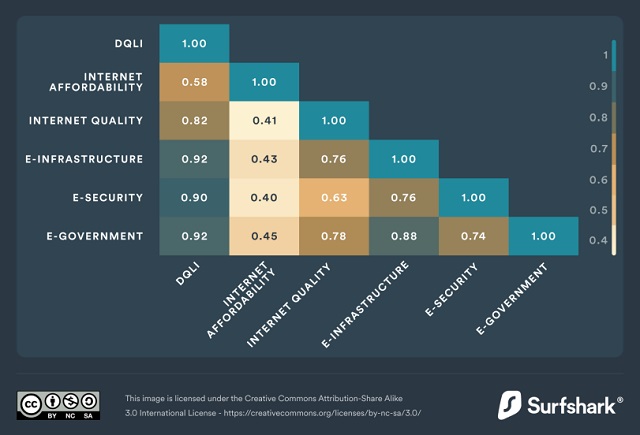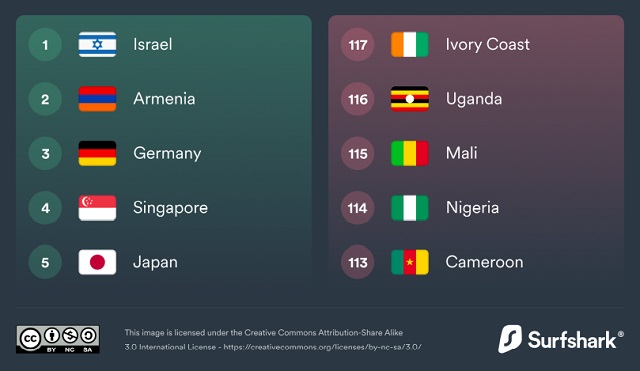
Government aware of harm to ICT use and innovations, growth in digital financial services, e-commerce, e-government
| THE INDEPENDENT | The cost of internet use in Uganda is the highest in the world, according to research by Surfshark; a cybersecurity company based in the Netherlands that deals in virtual private network (VPN) services, data leak detection systems, and private search tools. Surfshark is a subsidiary of Nord Security, the parent company of NordVPN.
According to Surfshark’s latest research of 2022, Uganda’s internet affordability ranks 116th out of 117 countries surveyed in the world or 92% of the global population. This means Internet in Uganda is not affordable compared to global standards.
To afford mobile internet, Ugandans have to work 510 times more (41 min 50 s/month) than Israeli citizens, for whom the most affordable 1GB package costs only 5 seconds of work monthly. Meanwhile, fixed broadband costs Ugandan citizens around 59 hours of their precious working time each month.
Ivory Coast is the only country with more expensive internet than Uganda in the world. It is ranked at 117 on Surfshark’s Digital Quality of Life Index 2022.
Internet usage data in Uganda is scanty, but some official data shows that only 52% of the population has access to the internet. The low penetration is blamed on the high cost of internet and smartphones and lack of infrastructure, especially in remote and rural areas.
The high cost of internet in Uganda has been blamed on high operating expense for service providers. The telecom companies must build or lease infrastructure to connect the country to the fibre cables on the Indian Ocean coast and deliver the data over a 900km route into the country.
In 2018 the Uganda government rattled the sector by introducing an Over-The-Top (OTT) tax that required users to pay a daily levy of Shs200 to access over 50 platforms including Facebook, Twitter, and WhatsApp. That failed and the government in 2021 introduced a 12% tax on internet data. This pushed up the cost of internet.
Research shows that expanded internet access can lead to greater economic activity and other beneficial economic impacts. For close to 40 years since the 1990s, economies around the world have benefitted from, among other things, the rapid growth in internet connectivity
Access to the internet can drive economic development through improved productivity of firms, workers, and other inputs in the production process. It can also connect larger pools of sellers and buyers through e-commerce; including in rural and remote regions.
Access remains low, however, with estimates that only 50% of the world population today uses the internet. In Africa that figure is about 30%. This is two years past the United Nations’ Sustainable Development Goal target of universal and affordable access to the internet by 2020.
The World Bank in its 2021 Development Report estimates that achieving universal broadband internet access by 2030 will require an investment of approximately US$100 billion in Africa alone for, among other investments, reducing retail costs of using the internet.
Surfshark’s annual Digital Quality of Life Index (DQL) research examines billions of people regarding five core pillars – Internet affordability, Internet quality, e-infrastructure, e-security and e-public services – and 14 underpinning indicators that provide a comprehensive measure. The study is based on the United Nations’ open-source information, the World Bank, Freedom House, the International Communications Union, and other sources. More than 7.2 billion people were examined for compilation of the 2022 Index. This is the fourth annual edition of the Digital Quality of Life Index (DQL). Uganda joined the DQL Index for the first time this year.

Quick comparison
Comparing Uganda with other countries in the East Africa region, Kenya has the cheapest internet and is ranked at 92 on Surfshark’s Digital Quality of Life Index 2022. Tanzania is ranked at 107. Kenya’s internet quality is the same as Uganda but the internet in the neighbouring country is cheaper because it has far better electronic infrastructure and better e-government.
Tanzania also has cheaper internet than Uganda and almost same quality of internet and quality of e-infrastructure. Uganda has better e-security than Kenya and Tanzania.
Uganda’s internet quality, considering internet speed, stability, and growth, ranks 107th in the world and is 35% worse than the global average.
Regarding internet speed alone, Uganda’s mobile internet ranks higher than fixed broadband in the global ranking, operating at 20.6 Mbps/s (104th globally). Meanwhile, the fixed broadband internet comes 108th (16.3 Mbps/s).
Compared to Kenya, Uganda’s mobile internet is 14% slower, while broadband is 16% slower. In comparison, Singapore’s residents enjoyed mobile speeds up to 104 Mbps/s and fixed to as much as 261 Mbps/s – that’s the fastest internet in the world this year.
Out of all index pillars, Uganda’s weakest spot is internet affordability, which needs to improve.
Out of the five fundamental digital life pillars, Uganda’s best score is for e-security (66th). This is good news because, according to the researcher’s, E-government and e-security contributed to digital well-being the most; their investments settled a higher general DQL index. Uganda’s e-government services come 92nd, while internet quality and e-infrastructure rank 107th and 110th, respectively.
According to the Index, Israel has the best digital quality of life this year, followed by Denmark, Germany, France, and Sweden. Meanwhile, the USA dropped from 5th position last year to 12th in 2022.
Overall, 7 out of 10 of the highest-scoring countries are in Europe, which has been the case for the past three years. Israel ranks 1st in DQL 2022, pushing Denmark to second place after its two-year lead. Germany ranks 3rd, and France and Sweden round up the top five of the 117 evaluated nations. Congo DR, Yemen, Ethiopia, Mozambique, Cameroon are the bottom five countries.
Other highlights are that the world’s poorest countries pay the most for bad quality internet, some of them having to work an average of 2 weeks to earn the cheapest fixed broadband internet package.
The research found that the internet has become more expensive worldwide. Compared to last year’s results, people have to work six minutes more to buy the basic broadband internet plan.
It found that that money or GDP per capita is not the main driving factor for the quality of e-infrastructure and a reason for advancing e-security. Some countries with lower GDP have higher DQL index than expected – 17 out of 117 countries rank higher in this section.

Deepening global digital divide
Globally, broadband is getting less affordable each year. Looking at countries included in last year’s index, people have to work six minutes more to afford broadband internet in 2022.
In Ivory Coast and Uganda, people work an average of 2 weeks to earn the cheapest fixed broadband internet package. The same trend was observed last year. With the current inflation, the pressure on low-income households that need the internet has become even heavier. Surfshark’s study also found that countries with the poorest internet connection have to work for it the longest.
“While countries with a strong digital quality of life tend to be those of advanced economies, our global study found that money doesn’t always buy digital happiness,” – explains Gabriele Racaityte-Krasauske, Head of PR at Surfshark. “That is why, for the fourth year in a row, we continue analyzing the Digital Quality of Life to see how different nations keep up with providing the basic digital necessities for their citizens. Most importantly, our research seeks to show the full picture of the global digital divide that millions of people are suffering from.”
The Uganda government appears to be aware of the harm that the high cost of internet imposes on ICT use and innovations, growth in digital financial services, e-commerce, e-government and more. According to the Ministry of ICT and National Guidance, the government aims to reduce the cost of internet by slashing the national backbone infrastructure fibre data costs from $70 per Mbps per second to $30by end of 2022.
Among highlights of the 2022/23 Financial Year is a Digital Transformation program to be implemented by the Ministry of ICT to increasing the national ICT infrastructure, usage in national development and service delivery, and research, innovation and commerce. The program aims to increase Internet penetration to 7O% and achieve countrywide 4G coverage.
In FY 2021/22 internet access was at 52% with 21 million users and 23 million people using mobile money services. The year saw an increase in internet use by sectors like education where online classes were in vogue due to the nationwide lockdowns to stop spread of the COVID-19 disease. Many firms also switched to use of Virtual Private Networks (VPN) to facility safety away from office work related applications and e-commerce thrived on home deliveries of food and sundries. The government also allocated 26% more money to the ICT sector compared to the previous financial year.
****
 The Independent Uganda: You get the Truth we Pay the Price
The Independent Uganda: You get the Truth we Pay the Price



